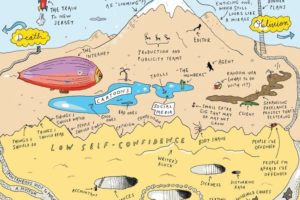On October 5th, the world has begun to mourn the loss of one of its most creative innovators, tenacious entrepreneurs, and iconic figureheads in the passing of Steve Jobs. From the petri-dish of creativity that was a silicon valley garage, Jobs constructed a company that competes with Exxon-Mobil for the largest market capitalization. Obama has spoken for many in reminding us that we have lost a visionary, and perhaps one of the most successful exemplifications of the “American Dream.”
Any perusal of the internet or news will reveal countless memorials and statements made in the wake of Job’s passing. Scanning my own Facebook newsfeed gives me an instant picture of how much my peers and my generation value Job’s contributions to technology and its imprint on their lives.
Yet what are some of the more interesting discussions and writings I have seen over the last few days are those that take a moment to reflect on the Spiritual life of Steve Jobs. After completing high school, and several years working with companies such as HP and Atari, Jobs took his savings and left for a spiritual pilgrimage to India. It is here that he became and a Buddhist and experimented with Psychedelic drugs, which Job calls one of the most important things he had done in his life. Later, Jobs meet and established a life-long relationship with a Japanese Zen Buddhist master, Kobun Chino Otogawa.
With learnings from these influences, Jobs’ life philosophy seems to best be described by one of self-discovery, self-reliance, and living each day as if it were one’s last. In a frequently cited and watched Commencement Address given at Stanford University in 2005, Job’s communicated his philosophy with charges such as:
“Dogma…is living with the results of other people’s thinking.”
“Be what you truly want to become, everything else is secondary.”
These drivers, combined with the influences of the counter-cultural “hippie” generation from which Job’s grew up, lead to the crafting of a unique worldview. Job’s egomatic-renegade thinking reflect in some of this other nuggets, such as “Why join the navy if you can be a pirate?” and his Stanford speech conclusion “Stay hungry, stay foolish.”
As humans, its clear that the biographies of those who make a dent in our world and world history fascinate us. In addition to fascination, it seems there is also the burning curiousity that if we can figure out how others lived, perhaps we can imitate and experience a similar taste of success or rise to some form of greatness.
Now, as Christians, what have we to learn, or dare I say, even imitate, about the life of Steve Jobs?
Scripture is clear that one of the consequences of the fall is the corruption of the imageo dei, the “Image of God,” that characterizes humans as the pinnacle of creation. Yet although broken and shattered, traces of this still remain, from which Christian orthodoxy in large part develops a theology of human worth and the value of human life, even on this side of Eden.
So, what biblically commendable attributes can we find in the life of Steve Jobs?
Insatiable Zeal
There are many testimonies that share insight on both the momentous highs, but also the incredible lows, that come with working with one as zealous in his passion and his mission as Jobs. So certainly, it has its good and its bad. The same is true in the Biblical literature, as zhloj in its good sense communicates the idea of ardor, were as it can also mean jealousy or envy. Paul uses it positively to describe the Corinthians zeal and mourning for him, for which the church is commended (2 Cor 7:7). Four verses later, it appears to be the fruit of godly sorrow. And in 2 Cor 11:2, Paul describes feeling a “godly jealousy” that drives him to labor to faithfully present the church, Christ’s bride, beautiful and pure to her husband.
Yet, how much zeal do we see in the church today for the things of God, and particularly (as is the context in most of is usage in 2 Cor) towards the growth and the sanctification of the fellow believer? Perhaps I’m being to anecdotal here, but I know that looking on my experiences within the church, and most truly, my own life and failure in commitments, it is sad to see how many people fall through the cracks, how little follow up is given to people’s prayer requests, and how little a zeal there is for stirring on one another towards Christ, towards love, and to good works. Zeal for his work is one attribute that separate Jobs as a figure of interest and intrigue among men. Might the church not seem more interesting, or perhaps a better word, more credible, in the eyes of a watching world, if there was a zealous and arduous love for one another and the priorities of the Kingdom in our lives a well?
An Eschatological Mindset
“Death is very likely the single best invention of life… Death is life’s change agent…Knowing that I’ll be dead soon is the most important tool I’ve ever encountered to help me make the big choices of life.”
As much as these adages sound familiar to those (like myself) who grew up on the crux of the self-esteem movement, I feel few who are arguing that Jobs’ did not really live by them.
Although this may be a theological stretch of the word, Jobs lived life with a keen perspective on the end. Should the life of the Christian be any different? Scripture is clear that the believer is to live a life of daily expectation, for as John reminds us, our Lord says, “Yes, I am coming quickly.” Living in light of eschatological realities brings us encouragement and motivation for living and realizing our assured justification and purchased redemption. It gives us hope for peace and relationships in the church, knowing that all conflicts and disagreements will cease when we are given resurrection bodies and united as a royal priesthood and a holy nation (1 Pet 2:9).
But, is it biblical to have such a similar perspective of death? In a recent 5:20 AM Bible study, I remember the brain-branding thoughts of my Executive pastor, who said that the older he gets (although he still awaits the pending and potentially immediate coming of Christ at any time), the more he feels the weight of the reality that his days on earth to serve the Lord are so assuredly fewer than they were the day, or year, or stage in life…before.[1] The longer we live, the shorter the window we have to love our God by telling other’s about His truth, love, and goodness. There is urgency to be found in remembering that our role as ambassadors to a world lost in darkness is limited.
Jobs said “If today is the last day of my life, would I want to do what I am about to do today?” No one will discredit the impact of how this philosophy changed the landscape of technology. In what way would the spiritual topography of our neighborhoods change if we lived with a eschatological perspective today?
Serenity in Simplicity
Jobs said that Apple would never be what it is today were it not for his auditing of a calligraphy class at Reed College in Portland, OR. “If I had never dropped in on that single calligraphy course in college, the Mac would have never had multiple typefaces or proportionally spaced fonts.” Apple success, Jobs has described, is just about what it is not, as about what it is. This reference describes the simplicity, cleanliness, and user-friendliness that has come to characterize Apple software and hardware products. Apple stands as a “de-clutter-fier” of the electronic market place, and has found the power and the appeal that simplicity has over complexity.
Perhaps the iPhone works as a good analogy to theology. Its true complexity is enormous. Yet this unfathomable complexity produces a powerful simplicity that is results in amazing applicability. Although we can only hope to fully understand the vast riches, treasures and tensions housed in the Scriptures when we see Jesus face-to-face, we can find peace, solace, and power in the simple truths and realities that Scripture clearly culminates in. Biographies on the world’s greatest pastor’s, clergymen and missionaries will often times reveal that the power behind these ministries lied in the simple power of the Gospel.
Perhaps (especially the armchair theologian such as myself) one will find great benefit in stepping back from thoughts of debates on infralapsarianism and the maze of deciphering textual variants to feed one’s soul- and this by remembering and mediating on the most central truths of the Bible. When we can learn to summarize our learnings in a fashion of simplicity as Karl Barth did, we too can operate out of the realization that there is power in simplicity, remembering:
“Jesus loves me, this I know; for the Bible tells me so.”
[1] Certainly, with a glorified body the believer will worship and serve our Lord for eternity, yet the ways in which we can love and serve him in the capacities we are privileged to have on earth (evangelism, discipleship of others) are limited.





1 Comment
Leave your reply.